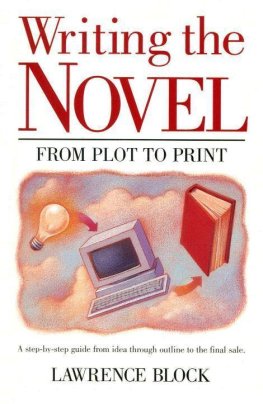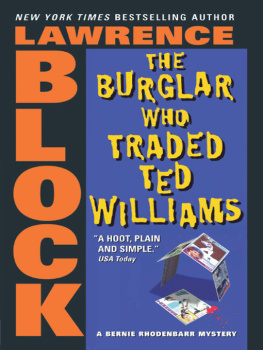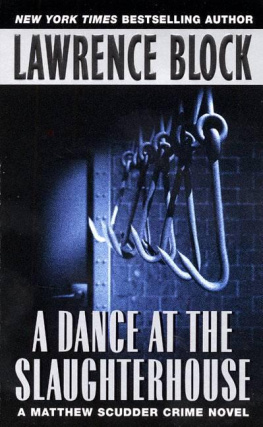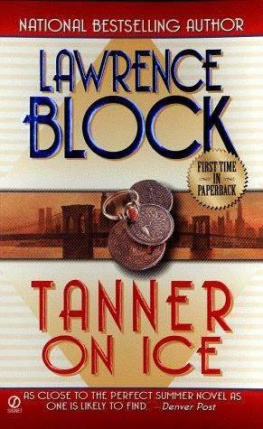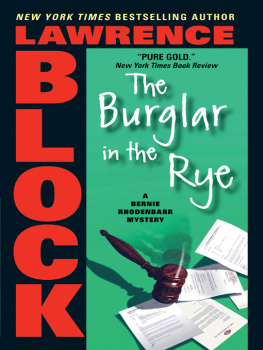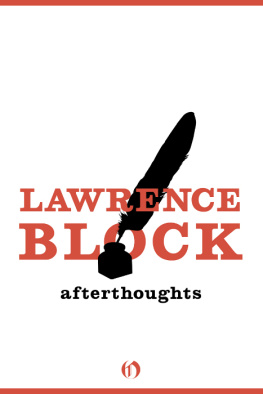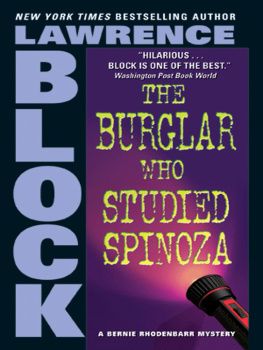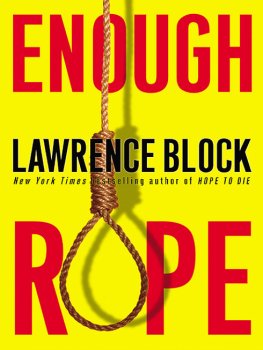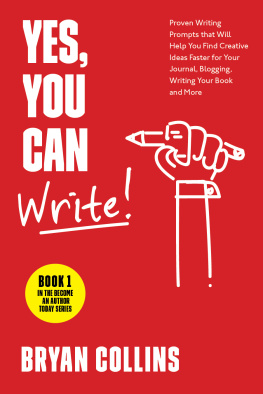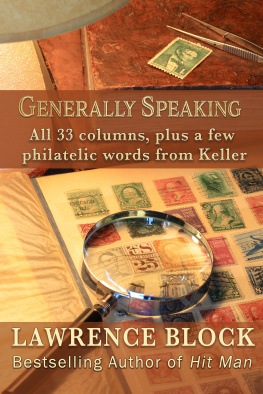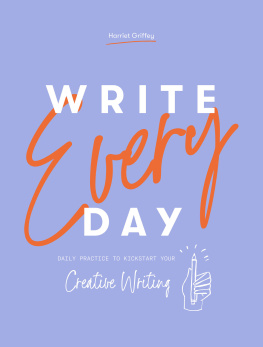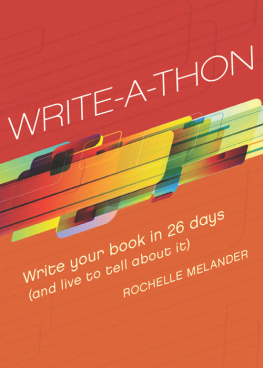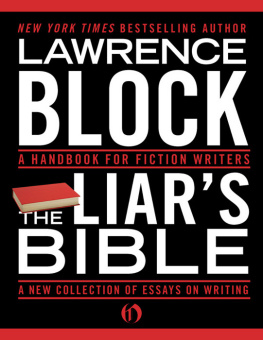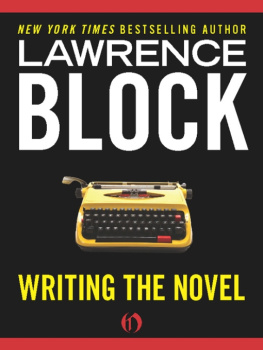Lawrence Block
Writing the Novel: From Plot to Print
For Miss May Jepson, my 11th Grade English teacher at Bennett High School in Buffalo, New York, who first encouraged me to become a writer;
For my mother and father, whose support toward that end was unflagging;
For John OHara, Evan Hunter, Fredric Brown, W. Somerset Maugham, Rex Stout, Dashiell Hammett, James T. Farrell, Thomas Wolfe, and so many more writers from whom Ive learned so much of what I know;
For Nolan Miller, whose writing workshop at Antioch College was my nursery;
For John Brady, who encouraged me to write about writing;
For my daughters, Amy and Jill and Alison, who can be whatever they want in this world;
For Bill and all his friends, who have shared their experience, strength and hope;
And for Mary Pat, with all my love.
Before this present volume was in the planning stages, I circulated a questionnaire on writing methods with the intention of doing a magazine piece on the subject. A large number of writers of fiction and nonfiction alike were kind enough to reply at some length. While my article was not ultimately published, the replies to my questionnaire were of inestimable value to me when it came time to write this book on the novel. Ive had occasion to quote from several of the replies I received; all of them in one way or another enlarged my understanding of how writers do whatever it is that we do.
This books defects are mine alone. For its strengths, I should like to acknowledge the assistance of all those who replied to my questionnaire, to wit:
Mary Amlaw, Poul Anderson, Mel Arrighi, Isaac Asimov, Michael Avallone, Jean L. Backus, Eugene Franklin Bandy, D.R. Benson, Robert Bloch, Murray Teigh Bloom, Barbara Bonham, Jon L. Breen, William Brittain, Barbara Callahan, William E. Chambers, Thomas Chastain, John Cheever, Mary Higgins Clark, Virginia Coffman, George Harmon Coxe, Linda Crawford, Clive Cussler, Dorothy Salisbury Davis, Richard Deming, F.M. Esfandiary, Stanley Ellin, Harlan Ellison, Robert L. Fish, Patricia Fox-Sheinwold, Lucy Freeman, Anne Freemantle, Tonita S. Gardner, Brian Garfield, Herbert Gold, Arthur Goldstein, Joe Gores, Marilyn Gran-beck, Russell H. Girran, Irving A. Greenfield, Isidore Haiblum, Joseph Hansen, Joyce Harrington, Tony Hillerman, Edward D. Hoch, Peter Hochstein, James Holding, Hans Holzer, Dorothy B. Hughes, Beatrice Trum Hunter, Bel Kaufman, Richard Kostelanetz, Eda J. LeShan, Elizabeth Levy, Robert Ludlum, John Lutz, Arthur Lyons, Arthur Maling, Harold Q. Masur, John D. MacDonald, Ross Macdonald, Gregory McDonald, Thomas M. McDade, Patricia McGerr, William P. McGivern, James McKimmey, Francis M. Nevins, Donald Newlove, Stephen R. Novak, Al Nussbaum, Dennis ONeil, Robert B. Parker, Don Pendleton, Judson Philips, Richard S. Prather, Bill Pronzini, Tom Purdom, Robert J. Randisi, Malcolm Robinson, Willo Davis Roberts, Sam Ross, Sandra Scoppettone, Justin Scott, Henry Slesar, Martin Cruz Smith, Jerry Sohl, Jane Speed, Aaron Marc Stein, Richard Martin Stern, Ross Thomas, Lawrence Treat, Louis Trimble, Thomas Walsh, Stephen Wasylyk, Hillary Waugh, Sol Weinstein, Edward Wellen, Helen Wells, David Westheimer, Donald E. Westlake, Collin Wilcox and Chelsea Quinn Yarbro.
This is a book designed to help you write a novel. It contains the distillation of my own experience of twenty years as a published novelist, plus a considerable amount that Ive learned from other writers. My goal throughout has been to produce the sort of book I might have found useful when I set out to write my own first novel.
But there are no guarantees. Just because youve bought this book, just because youve studied it diligently, does not mean for a moment that your success as a novelist is a foregone conclusion. You may never write so much as the first paragraph of a novel. You may begin work on a book and find yourself unable to complete it. Or you may labor long and hard on a book, working your way through outline and first draft and final polish, only to discover that youve turned a perfectly good ream of paper into something commercially unviable and artistically indefensible.
These things happen. That they happen constantly to neophyte writers should hardly be surprising news. What may be more of a surprise is that they happen to seasoned professional novelists as well.
They even happen to me. Over the years, Ive published, at last count, twenty novels under my own name, plus perhaps five times that number under various pseudonyms. You would think that all that furious typing would have resulted in my having learned something, that while I might not know how to tie my shoes or cross the street I ought certainly to have the mechanics of writing a novel down cold by now.
But in the past two or three years Ive had perhaps half a dozen ideas for novels that got no further than the first chapter. Ive written three novels that died after Id written over a hundred pages; they repose in my file cabinet at this very moment, like out-of-gas cars on a highway, waiting for someone to start them up again. I very much doubt theyll ever be completed.
Thats not all. During that same stretch of time Ive seen two novels through to completion and succeeded only in producing books that no one has wanted to publish and, Ive come to believe, for good and sufficient reason. Both were books I probably shouldnt have tried writing in the first place. Both failures constituted learning experiences that will almost certainly prove beneficial in future work. While I could by no means afford the time spent on these books, neither can I properly write that time off as altogether wasted.
But how could an established professional write an unpublishable book? If hes written a dozen or two dozen or five dozen publishable ones in a row, wouldnt you think hed have the formula down pat?
The answer, of course, is that theres no such thing as a formula. Except in the genuinely rare instances of writers who tend to write the same book over and over, every novel is a wholly new experience.
In Some Thoughts I Have in Mind When I Teach, Wendell Berry makes the point that
No good book was ever written according to a recipe. Every good book is to a considerable extent a unique discovery. And so one can say with plenty of justification that nobody knows how to write. Certainly nobody knows how other people ought to. For myself, though I think I know how to write the books I have already written and though I guess, wrongly no doubt, that I could now write them better than I did I am discomforted by the knowledge that I dont know how to write the books that I have not yet written. But that discomfort has an excitement about it, and it is the necessary antecedent of one of the best kinds of happiness.
Some of the books I write involve series characters. Ive done three books, for example, about a burglar named Bernie Rhodenbarr; in each of them he becomes the prime suspect in a homicide investigation because of his activities as a burglar, and in order to get himself out of the jam he has to solve the murder himself. There is, clearly, a similarity to the structure of all three of these books which at a cursory glance might well look like a formula.
But each plot is significantly different and each book, let me assure you, has presented its own specific problems. You might think the books would become easier to write. The third, just recently completed as I write these lines, was by a fair margin the most difficult of the three.
As a noun, novel means a book-length prose narrative. As an adjective, it means of a new kind or nature. The dual definition is historic, of course, deriving from a time when the novel was a new fictional form. Still, I see it as a happy accident, for every novel

